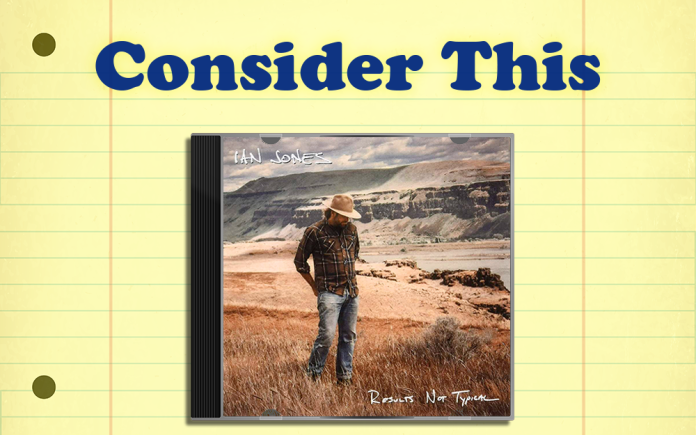
“Results Not Typical” ianjonesmusic.com
By Eleni P. Austin
Ian Jones grew up listening to The Beatles and Bob Dylan, along with Outlaw Country legends Waylon Jennings, Willie Nelson and David Allan Coe. One of three siblings, he was raised by a single mom in the shadow of Mount Rainier. It was a hardscrabble existence, as he recently recalled, “my babysitter was the record player.”
By the time puberty hit, he was writing his own songs on a beat-up Classical guitar. He cycled through a series of bands as he relocated from Seattle to Santa Barbara to L.A. In 2021, he released his solo debut, the Evergreens EP.
A prolific songwriter, he quickly amassed enough new music to record his first official long-player. Reaching out to his old pal, musician/producer Jesse Sibenberg (Lukas Nelson & Promise Of The Real, Lissie, Kenny Loggins), they corralled a wolfpack of talented pickers and players to add some instrumental color. The result is Not Typical.
The album opens tentatively with “Rollin.” Sun-dappled acoustic guitars lattice searching piano chords, thrumming bass keening pedal steel and brushed percussion. Ian’s warm tenor echoes antecedents like James Taylor, Jackson Browne and Elton John. Efficacious lyrics hint at a hard case of wanderlust; “I crossed the border, California bound, night was falling, dawn coming on fast, Thank God almighty I am free at last, and I’m out on the road and I’m rollin’/Then I put my feet on uncertain ground, guard up, to keep from falling, but I didn’t seem to find any peace around, so I hit the road and I’m still rollin’.” A sturdy piano solo hurtles through the break, underscoring the restless reluctance to embrace real life responsibilities.
Over 11 tracks, Ian somersaults through a plethora of styles and consistently sticks the landing. Three songs serve up a potent combo-platter of Rock, Soul and R&B, traveling a path pioneered by Derek, some Dominos, Delaney, Bonnie plus a few Mad Dogs and Englishmen. “Without You I’m Lost” blends a breezy conga-fied beat, tropical guitars, rippling piano runs, buoyant bass, a snazzy horn section and fluttery woodwinds. Lyrics offer an ardent encomium to his better half; “I’ve traded my sweat for a dollar at the end of a long hard day, the ache in my back and the lines on my face is the price I pay, the love I find when I come home to you is worth it whatever the cost, and I know that without you, I’m lost.” On the break, the horn section hugs the melody’s voluptuous curves, sidling up to Big Easy piano notes, lithe guitar licks and twinkly percussion, before powering down on a dime.
“You Can’t” immediately takes flight, launched into the stratosphere powered by churchy keys, swirly Wurlitzer, angular bass, flinty guitars, shivery pedal steel, brass and woodwind accents and a propulsive beat. Part Big Pink workout, part sanctified stomp, lyrics are suffused in bitterness and betrayal; “You’re caught at the cross roads of a truth and a lie, you turn to go one way, but it’s dark and you’re tired, you try and explain, say this time it will last, you think there’s a way to take back what you say, but you can’t.” The arrangement builds to an ecclesiastic crescendo on the final instrumental break, that feels cathartic even when the lyrics offer no respite.
Meanwhile, “Lost Highway” is an ode to the open road anchored by syncopated horns, pulsating woodwinds, thready bass, tensile guitars and liquid keys. Tart Wurlitzer notes punctuate each twist and turn as meandering lyrics try to outrun a broken romance; “Sometimes the trees can get so thick here upon us, you think that we’d be blind and miss that forest, but you might just think that we’re blind anyway, it might be wrong, hell, it really don’t matter, if you were listening you might hear my heart shatter as I pick myself up off that lost highway.”
The best songs here match nuanced narratives to memorable melodies and dexterous arrangements. “You’re Gone” takes from Steve Earle’s well-worn playbook, offering a masterclass in heartache. Willowy guitar notes, bruised bass lines, faded pedal steel and dusty keys are wed a thunky 3/4 beat. Ian slips into the skin of a contrite but clueless ex-husband trying to woo his former flame; “I dusted off my mirror, grabbed a pair of jeans and my best shirt, pulled myself together the best way I know how despite the hurt, I gathered up my courage and walked up to you because I wanted to dance, but you walked out in front of me, straight out the door, before I got the chance.” A mournful pedal steel solo underscores the solitude and the ache.
Somewhere between Jimmy Webb and early Elton John stands “Athens Smiles.” Honky-Tonk piano notes are bookended by shimmery guitars, spidery bass and a snappy shuffle rhythm. Once again, the road beckons, offering a temporary panacea for a girl itching to escape her Georgia hometown. Working her way toward the west coast, this expansive travelogue is fueled by swoony strings. Of course, L.A. proves too much for the (wo)man, and soon enough she’s back on the road; “Now the road east from California is hot and long and without end, and by the time she reached Odessa, I bet she was glad to leave the 10, down through Dallas and Texarkana, Memphis, Chattanooga then she’ll go rolling back down into Athens, watching Athens smile again.”
On “Again,” stately piano chords dovetail with shuddery bass, sinewy acoustic guitar and a barely-there beat. Sepia-tone lyrics unspool a solitary saga of an outlaw on the run; “Sun went down and I never looked back, ditched the body ‘neath the railroad tracks, crossed the border and headed south, where it was easier to fit in.” Lofty electric guitar riffs soar untethered, even as this wily desperado longs to be free; “Now I think I’m safe and there ain’t no one around, take time to get straight, see what I’ve found, thought I had a good thing, thought I’d settle down…again, again, I’m on the run.”
Finally, “Have Mercy” is a sad sack Waltz anchored by a walking bass line, strummy guitars, high lonesome pedal steel, plaintive piano and a shambling beat. A lachrymose lament steeped in self-pity, (Crocodile) tears fall into beers and the Lord is on stand-by. But this guy is just going through the motions; “It’s been so many years, and long lonely nights where I cried in my beer, I asked for forgiveness so many times, and all those times you stayed, but now you’re gone, I’ve made my excuses, I know I was wrong, so have mercy, take a chance on me.” It’s clear his “kind woman” is in the wind.
Other interesting tracks include the tender piano ballad, “She Is Lost,” as well as “Some Day,” a molasses-thick shot of redemption. The album closes with “Goodbyes Are The Hardest Words.” Ghostly piano notes connect with spectral guitars, nimble bass lines and a rock-ribbed beat. A bit of a restless farewell, the lyrics are shot through with sin and salvation, gravitas and grace; “And if I reach the gates before you, I’ll be waiting to take your hand, cause forever lasts a long time or so I’ve heard, so far now I’ll just say I love you and I’ll see you in a little while, cause goodbyes are the hardest words.” It’s a melancholy end to a great record.
This is a solo album in name only, alternately, Gabe Noel and John Flaugher held down the low end on bass. Piano, keys and Wurlitzer were handled by Dave Palmer and Aaron Embry, Jason Soda and Paul Jacob Cartwright played guitar. Lee Thornberg tackled brass and horn arrangements, Paulie Cerra did the same for woodwinds. Joey Waronker played drums on every track, and producer Jesse Sibenberg achieved MVP status by adding pedal steel, electric guitars, percussion and backing vocals.
Ultimately, the triumph of Results Not Typical belongs to Ian Jones. He has crafted a cogent set of songs that are at once fresh and familiar, intimate and universal. Each one hitting that perfect bittersweet spot.










































